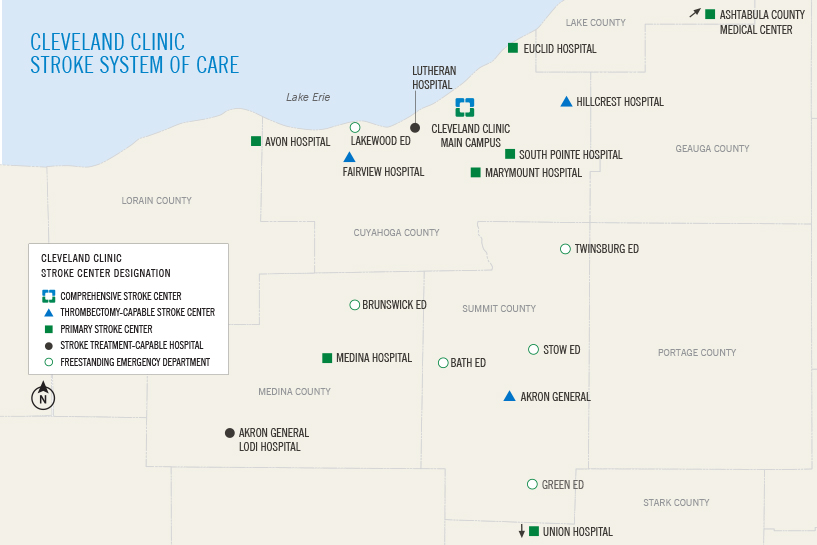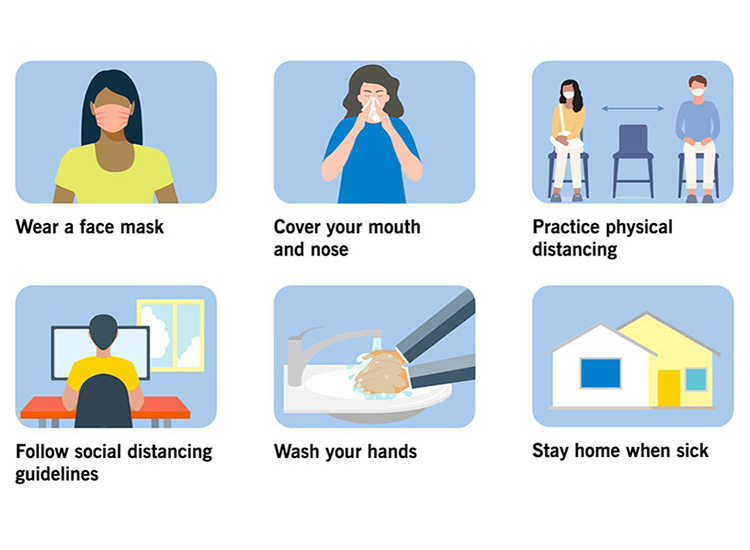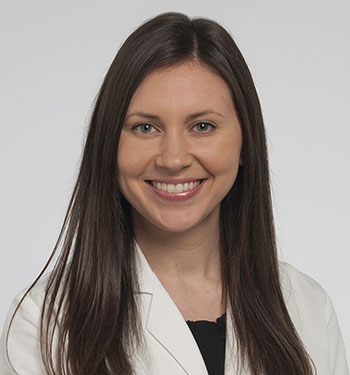Flu vs. COVID-19
Take precautions. Know the difference. Contact your doctor if you develop symptoms.
“It’s always important to get a flu shot, and this year we’re encouraging everyone to get one sooner rather than later due to the added concerns of COVID-19,” says Christina Vincer, MD, a family medicine physician who treats patients at Cleveland Clinic Strongsville Family Health Center. “Our goal is to have people vaccinated before we start seeing cases of the flu.”
While Dr. Vincer believes it is possible the precautions being taken to stop the spread of COVID-19 could result in a more moderate flu season, she still urges everyone to be vigilant and continue to take these precautions to protect themselves and others:
- Wear a face mask.
- Practice social distancing; maintain a 6-foot distance from others.
- Avoid crowds and groups of people.
- Stay home if you are sick.
- Wash your hands often.
- Cover your cough or sneeze.
- Avoid touching your eyes, nose and mouth.
- Clean and disinfect frequently touched objects and surfaces.
“While no single step is effective on its own, together these actions can add layers of protection,” Dr. Vincer advises. “Add in being vaccinated against the flu, and our chances of avoiding a flu pandemic on top of the COVID-19 pandemic improve significantly.”
“It’s easy to feel a lack of control during this unprecedented time. In addition to getting a flu shot, engage in lifestyle behaviors that can help optimize your health and boost your immune system. These include eating nutritious whole foods, getting enough good quality sleep, reducing stress and engaging in regular movement.”
As the coronavirus pandemic continues to evolve, Cleveland Clinic and The Clorox Company have partnered on a general reference guide you can refer to in order to protect yourself, your loved ones and your community from further spread.

Is it the flu? Or is it COVID-19?
Flu viruses and coronaviruses are different, but they are passed from person to person in similar ways — through droplets that come out of someone’s nose and mouth when they cough, sneeze or talk. When another person inhales these droplets, that person can become infected.
“It may also be possible for you to become infected by touching a surface that’s contaminated with the virus and then touching your mouth, nose or eyes,” says Dr. Vincer. “Another concerning thing about these viruses is that both of them can be spread by someone who is infected before they even develop symptoms.”
According to the CDC, COVID-19 and the flu can lead to a range of mild to severe illnesses in both children (though their symptoms are less defined) and adults with the following common symptoms:
- Fever
- Cough
- Shortness of breath
- Tiredness
- Sore throat
- Runny or stuffy nose
- Body aches
- Headache
“In COVID-19 patients, the sudden loss of the sense of taste and smell is a unique symptom, along with complaints related to difficulty concentrating and confusion,” says Dr. Vincer. “We’re also seeing more diarrhea, or nausea and vomiting. COVID-19 seems to be affecting almost every organ system in the body.”
An added concern for children is respiratory syncytial virus or RSV. This common virus usually causes mild, cold-like symptoms but can be serious, especially in infants and older adults. RSV is the most common cause of inflammation of the small airways in the lung and pneumonia in children younger than one year of age.
“At this time, the importance of flu shots and routine immunizations for children is of utmost importance,” says Dr. Vincer. “In response to COVID-19, Cleveland Clinic has taken every precaution to provide safe care. Children who are not vaccinated are at higher risk for developing preventable illnesses like measles and whooping cough.”
Cleveland Clinic’s stroke system offers high quality care across Northeast Ohio.
Cleveland Clinic cares for one of the largest populations of stroke patients in the country, with more than 6,800 encounters annually. These volumes have allowed us to build one of the best-developed stroke systems of care in the U.S.

The Comprehensive Stroke Center on Cleveland Clinic’s main campus serves as the hub in an integrated stroke care network. This is the highest level of stroke certification provided by the Joint Commission, earned only by an elite group of hospitals across the U.S. for providing state-of-the-art, leading-edge care for the most complex stroke cases.
Cleveland Clinic health system also boasts an additional three Thrombectomy-Capable Stroke Centers, seven Primary Stroke Centers and two regional hospitals capable of initiating acute stroke treatment.
What does this mean in your community?
“In order to meet the requirements for Joint Commission accreditation as Thrombectomy-Capable Stroke Centers, Akron General, Fairview and Hillcrest hospitals had to show demonstrated capabilities including the ability to care for patients exhibiting disabling stroke symptoms, not transferring stroke patients to other facilities, and monitoring outcomes of care provided,” explains Dr. Gebel.
The facilities have an acute stroke team available 24/7, a neurologist accessible 24/7 in person or via telemedicine, designated stroke beds, sufficient diagnostic services, and the ability to provide IV thrombolytics, and track, monitor and report performance measures.
“We have proven we are able to perform these services and perform them reliably, and have the processes in place to take care of all stroke symptoms, including those with large blood clots in the brain which might benefit from a process to remove the clot,” Dr. Gebel adds.
All of our emergency departments can treat stroke patients with tissue plasminogen activator (tPA / alteplase) – an FDA-approved medication to treat ischemic stroke which is administered through a vein. Called a “clot-busting” medication, tPA is administered to ischemic stroke patients who meet eligibility criteria and arrive at the hospital within 0-4.5 hours of stroke symptom onset.
Akron General, Fairview and Hillcrest hospitals offer a second type of treatment for stroke:
- Mechanical thrombectomy – a minimally invasive clot retrieval method that involves inserting a very small catheter through an artery until the blocked blood vessel is reached, a small device retriever is deployed, the clot is captured and removed, and blood flow is restored to the brain.
Access to advanced care when you need it.
Nearly 1 in 4 strokes occur in people who have had a previous stroke. Advanced care, including carotid stenting procedures, is available to these individuals at Cleveland Clinic’s Comprehensive Stroke Center.
Treatment options
If you have flu-like symptoms, you should call your health care provider and:
- Rest.
- Drink plenty of fluids.
- Eat a light/bland diet.
- Stay home.
- Take acetaminophen to reduce fever and relieve muscle aches.
“Special drugs or treatment are not necessary for most people with influenza who are otherwise healthy,” says Dr. Vincer. “However, if you are seriously ill and you seek care within 48 hours of the onset of symptoms, your doctor might prescribe an antiviral drug like Tamiflu®.”
While there is currently no outpatient treatment for COVID-19, some experimental treatments show promise for helping hospitalized patients, including the use of remdesivir, a drug that was recently approved by the FDA.
“Until a vaccine is developed, or a better viral treatment is available for COVID-19, we must rely on personal protective measures,” adds Dr. Vincer. “If you have symptoms, take care of yourself, isolate at home, schedule a virtual visit and get tested if appropriate.”
“Also, it’s important to remember that you are not alone, and you shouldn’t hesitate to reach out to your doctor’s office. The pandemic has placed an extraordinary amount of stress on everyone. My experience as a family medicine physician has shown me that mental health is a crucial part of overall health and well-being. We should all try our best to support each other and remember that people are doing the best they can in these circumstances. My colleagues and I are here to provide support to you and your families during this time.”
Roy Miler, MD
Lorem ipsum dolor sit amet, consectetur adipiscing elit, sed do eiusmod tempor incididunt ut labore e.
Lorem ipsum dolor sit amet, consectetur adipiscing elit, sed do eiusmod tempor incididunt ut labore et
Dolore magna aliqua. Quis ipsum suspendisse ultrices gravida. Risus commodo viverra maecenas accumsan lacus vel facilisis. Lorem ipsum dolor sit amet, consectetur adipiscing elit.
Roy Miler, MD
Lorem ipsum dolor sit amet, consectetur adipiscing elit, sed do eiusmod tempor incididunt ut labore e.
Lorem ipsum dolor sit amet, consectetur adipiscing elit, sed do eiusmod tempor incididunt ut labore et
Dolore magna aliqua. Quis ipsum suspendisse ultrices gravida. Risus commodo viverra maecenas accumsan lacus vel facilisis. Lorem ipsum dolor sit amet, consectetur adipiscing elit.
Nullam in enim ullamcorper, efficitur dui a, fermentum erat. Cras in massa eget nisi imperdiet hendrerit vel interdum tellus. Ut pellentesque neque ipsum, quis fringilla nisl volutpat vel. Cras et luctus ipsum, quis blandit ligula. Morbi elementum tincidunt nibh eu lobortis. Ut consectetur ut libero sed sagittis.
Lorem ipsum dolor sit amet, consectetur adipiscing elit, sed do eiusmod tempor incididunt ut labore et
Dolore magna aliqua. Quis ipsum suspendisse ultrices gravida. Risus commodo viverra maecenas accumsan lacus vel facilisis. Lorem ipsum dolor sit amet, consectetur adipiscing elit.
Roy Miler, MD
Lorem ipsum dolor sit amet, consectetur adipiscing elit, sed do eiusmod tempor incididunt ut labore e.

What if you develop symptoms?
Cleveland Clinic has taken every precaution to provide safe care in response to COVID-19, and is currently conducting COVID-19 testing for those experiencing symptoms.
If you’re experiencing at least two symptoms of COVID-19 or flu, we recommend you call your primary care provider or schedule a virtual visit with a Cleveland Clinic provider or through Cleveland Clinic Express Care Online.
If testing is indicated following the virtual visit, it can be scheduled at a Cleveland Clinic testing site. Some regional testing locations are now using a single nasal swab that tests for influenza A & B, COVID-19 and RSV.




